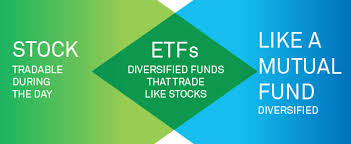What is an ETF (Exchange Traded Fund)?

✅ Introduction
ETF stands for “exchange-traded fund”. It’s an investment fund, but one you can trade super easily, like a stock: an investor can buy or sell it on a stock exchange at any time during the trading day.
An ETF works by first defining its overarching aim: usually to mirror the return of an index like the S&P 500 (a collection of the 500 biggest publicly traded companies in the US) or to track the value of a specific commodity (like oil). Typically, it then buys the underlying investments – for instance, if it’s tracking the S&P 500, it will buy all the stocks in that index in accordance with their weights in the index (which is based on each companies so-called “market capitalization”).
✅ Why Should I Care?
Many investors argue that low-cost tracker funds (whether ETFs or “index funds”) will outperform actively managed investments over the long term – primarily because of the high fees charged by the latter. Plenty of academic research backs up the claims; more anecdotally, Warren Buffett famously won a bet earlier this year that a simple investment that tracks the S&P 500 would outperform a collection of top hedge funds over a 10-year period.
✅ What Can I Do?
ETFs offer low-cost exposure to big, broad investment areas, like US stocks, global bonds and/or emerging market stocks. For a relatively small fee, a robo-advisor (check out our WTF on these here) will build and manage a portfolio of ETFs with the aim of meeting your investment aims while taking account of the level of risk you’re comfortable with.
✅ Who is this good for?
This choice is often good for those newer to investing, as well as those with a limited amount of money to invest. But other investors can benefit as well: a robo-advisor will automatically take action to amend your portfolio when appropriate, removing some of the behavioral characteristics (like trying to time the market) that often lead to sub-par investment performance.
✅ In Closing
Remember, ETFs are just a way that investments are structured. Usually it’s the underlying strategy (e.g. a “tracker”) and the cost of owning the investment that’s more relevant than the label. Nevertheless, ETFs have a role to play for most types of investors, including sophisticated investors as well as those that just want an easy and inexpensive way to gain exposure to the markets.
Keep in mind investing is difficult and risky; your capital is at risk.
Click Here to Read the Original Article on Finimize.com